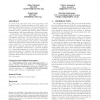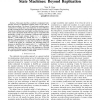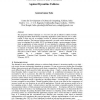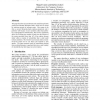153
click to vote
PODC
2012
ACM
13 years 4 months ago
2012
ACM
In recent years, there have been a few proposals to add a small amount of trusted hardware at each replica in a Byzantine fault tolerant system to cut back replication factors. Th...
154
click to vote
ICDCS
2011
IEEE
14 years 1 months ago
2011
IEEE
Many distributed software systems allow participation by large numbers of untrusted, potentially faulty components on an open network. As faults are inevitable in this setting, th...
134
click to vote
COMSUR
2011
14 years 2 months ago
2011
Interference is an unavoidable property of the wireless communication medium and, in sensor networks, such interference is exacerbated due to the energy-starved nature of the netw...
162
click to vote
ICDCN
2011
Springer
14 years 5 months ago
2011
Springer
We address the problem of designing distributed algorithms for large scale networks that are robust to Byzantine faults. We consider a message passing, full information model: the ...
154
click to vote
IPL
2010
14 years 9 months ago
2010
This paper deals with broadcasting in a network with t-locally bounded Byzantine faults. One of the simplest broadcasting algorithms under Byzantine failures is referred to as a c...
136
click to vote
WDAG
2010
Springer
15 years 19 days ago
2010
Springer
Abstract—This paper describes a method to implement faulttolerant services in distributed systems based on the idea of fused state machines. The theory of fused state machines us...
126
Voted
CORR
2006
Springer
15 years 2 months ago
2006
Springer
In this paper, we present a Byzantine fault tolerant distributed commit protocol for transactions running over untrusted networks. The traditional two-phase commit protocol is enh...
124
click to vote
CLEIEJ
2006
15 years 2 months ago
2006
The proposed software technique is a very low cost and an effective solution towards designing Byzantine fault tolerant computing application systems that are not so safety critic...
118
click to vote
OSDI
2000
ACM
15 years 3 months ago
2000
ACM
This paper describes an asynchronous state-machine replication system that tolerates Byzantine faults, which can be caused by malicious attacks or software errors. Our system is t...
WDAG
2000
Springer
15 years 5 months ago
2000
Springer
Work to date on algorithms for message-passing systems has explored a wide variety of types of faults, but corresponding work on shared memory systems has usually assumed that only...




